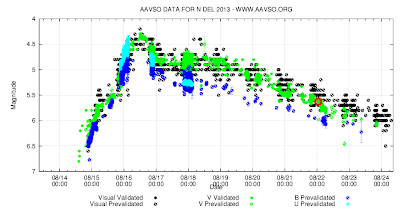In spite of the nearly full moon, I was able to spot Nova Delphini 2013 with my Canon Rebel XT and 300mm lens. The new nova (redundant?) isn't blowing apart like a supernova, but stealing enough gas from its neighbor to temporarily flare up much brighter than normal (10,000x brighter in a matter of days). The star itself is a white dwarf normally too faint to see with even some pretty hefty equipment (approximately +17 magnitude). I took a series of images and stacked them for a total exposure time of about 1 minute.
 |
| Stack of 79 light frames 1.3 sec each, 300mm, f/5.6, ISO 1600 (30 dark, 20 bias) |
Judging by the known magnitude of nearby stars, I'd estimate it at about +5.6 (but then again I've never estimated the magnitude of a nova before).
I used a
chart from the
American Association of Variable Star Observers (AAVSO) to identify the magnitudes of several other stars in my image, then tried to place N Del 2013 on a spectrum between them. This process is described in more detail
here.
As it so happens, my guess of 5.6 plots perfectly on the AAVSO light curve for N Del 2013. Indiana time is 4 hours behind UTC, and I took my photos at 10:30pm on August 21 - so that puts me smack dab in the middle of the green dots just after midnight UTC on August 22.
 |
Light curve for N Del 2013, data from www.aavso.org
My observation (red circle) added in Photoshop |
|
 |
A wider shot of Nova Delphini 2013 showing location relative to Delphinus
21 subs, 19 darks each at 75mm, f/4.5, 4 sec, ISO 1600 |
Check out the light pollution from the moon in this last image! On my camera's LCD screen I could barely make out Delphinus, but I'm glad it showed up in my image.



No comments:
Post a Comment